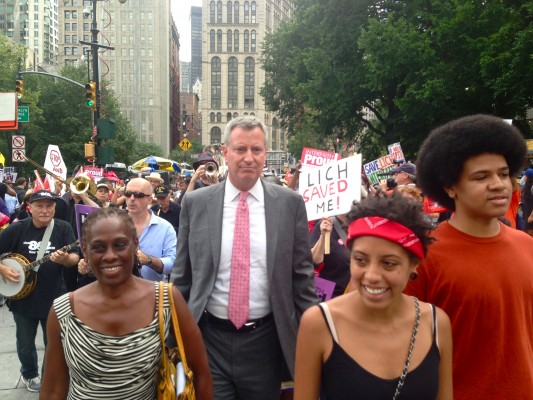Students and Faculty React to de Blasio’s Election Win
November 8, 2013

On Tuesday Nov. 5, Brooklyn native, Democrat Bill de Blasio, was elected New York’s 109th mayor. His election elicited both excitement and apprehension from faculty and students at Fordham College at Lincoln Center (FCLC).
According to an article by Michael Barbaro in the New York Times, de Blasio campaigned on the slogan “tale of two cities” – one rich and one working class – and focused on inequality. From his campaign, he spoke often about a real living wage and promised to require companies to guarantee paid sick days and paid family leave. In addition, de Blasio also pledged to build 200,000 affordable-housing units in the next decade.
Edward Bristow, professor of history, views the election of de Blasio as a good move for New York City. Bristow said, “De Blasio’s acceptance speech was important because our political discourse has not reflected the profound damage that rising inequality over the past 40 years has done to the United States.” He pointed to research that shows “people die because of inequality,” referring to the 27-year life-expectancy gap between residents of the richest and poorest neighborhoods in Glasgow, Scotland.
Bristow described de Blasio’s promise to require companies to guarantee paid sick leave as long overdue. Bristow said, “[Paid sick leave] is not unusual in European welfare states.” He also supports de Blasio’s plan to increase the minimum wage. “The minimum wage is insufficient to enable workers to rise above poverty. Research suggests that reasonable increases would not affect job creation,” Bristow said.
Furthermore, according to the article “De Blasios celebrate with ‘Smackdown’ dance” in the New York Post, De Blasio wants to increase taxes on those making a salary of more than $500,000 to fund universal pre-kindergarten. He strongly supports public schools, declaring his support for the provision of contraception to students. He thinks charter schools should be charged rent to use city land.
“It’s a change in spirit and attitude,” Thomas S. De Luca, Jr., professor of political science, said about de Blasio’s victory. According to De Luca, de Blasio may struggle to pass a tax increase because it has to be approved by Governor Andrew Cuomo. “[Cuomo] may have other political ambitions and he may not want to be in a position to raise taxes,” De Luca said.
According to his campaign website, de Blasio also pledges to end stop-and-frisk, a practice the New York Police Departent (NYPD) uses to detain and frisk anyone who looks suspicious. He also plans to replace Police Commissioner Ray Kelly, a strong supporter of stop-and-frisk. These positions helped him win support from 95 percent of New York’s African American voters.
While she strongly opposes stop-and-frisk, Associate Chair of Sociology Jeanne Flavin, an expert on race, said that she is cautiously optimistic about de Blasio’s pledge to end stop-and-frisk. She said that the practice itself has the possibility of ending soon. However, Flavin said that the process of ending stop-and-frisk could take a while. “It will no doubt take longer to recover the harm that the practice has caused to community trust and community-police relations,” she said.
Professor of English Shoshana Enelow, a resident of Brooklyn, said, “De Blasio’s election represented a certain ascendency of Brooklyn as a center of political power.”
Heartwarming is how Nadia Pinder, FCLC ’14, described the fact that de Blasio’s wife is African American and his kids are biracial. Pinder, a multi-ethnic student, is glad that the de Blasio family is multi-racial. “[The de Blasio family] is giving more visibility to multi-racial families,” she said. She hopes that de Blasio will be able to abolish stop-and-frisk. “I aspire to a city without stop-and-frisk, but I also aspire to a city without racial profiling in general,” Pinder said.
Barbara Wasserman, FCLC ’17, native of Park Slope, Brooklyn, the neighborhood where de Blasio was raised, said, “Everyone supports Bill de Blasio in my neighborhood.” Her brother even worked for de Blasio’s campaign.
Kyle McKee, FCLC ’17, on the other hand, is a bit skeptical of Bill de Blasio. “New York has been successful in being run by someone of the wealthy class, and I don’t know how that’s going to change when it’s run by someone who relates to the common man,” he said. McKee supports stop-and-frisk and opposes increasing taxes on the rich.









